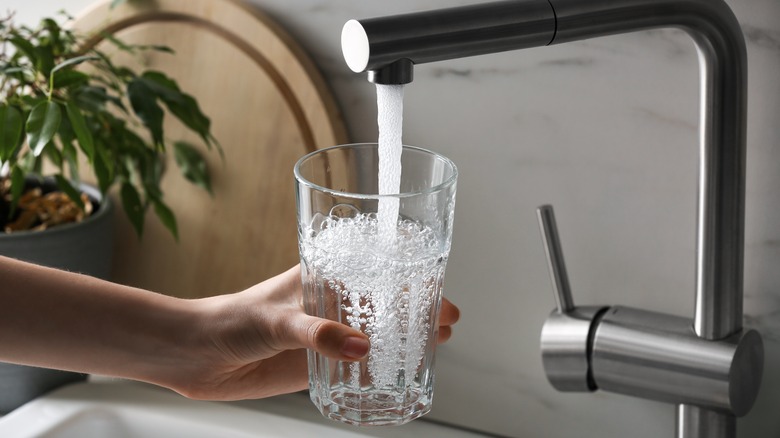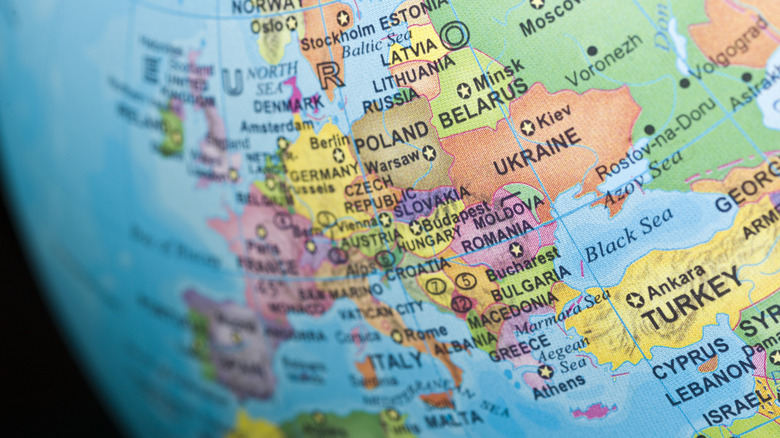Countries In Europe Where Tourists Need To Be Cautious Of The Tap Water
There are few things as frustrating as getting sick while traveling. From grappling with stomach bugs to battling unexpected fevers, dealing with an illness while you're far from home can often mean missed experiences, added expenses, and a whole lot of discomfort — all while navigating an unfamiliar territory or, worse, trying to find medical help in a foreign language.
In spite of precautions, a common culprit behind these travel woes is contaminated water or questionable food quality. And while destinations like Southeast Asia and Latin America might get a bad rep for traveler's sickness, the truth is that there are also plenty of European countries where drinking the tap water is a big no-no for both locals and tourists alike. With destinations located primarily in Eastern Europe, there's a list of places — from Croatia to Turkey — where locals and travelers agree it's best to close the tap and reach for bottled water instead.
Where to avoid drinking the tap water
When you're traveling in Europe, you should probably avoid drinking the tap water in certain countries, including but not limited to: Albania, Armenia, Azerbaijan, Belarus, Bosnia and Herzegovina, Bulgaria, Cyprus, Georgia, Hungary, Kazakhstan, Kosovo, Moldova, Montenegro, Romania, Serbia, Russia, and Ukraine. That said, it also depends on where you go within a country. Cities and tourist hubs typically have cleaner tap water than more rural areas.
Per the CDC, many countries on the list contain a potential Leptospirosis warning. The disease, which is caused by bacteria that spreads through animal urine, can infect humans who come in contact with dirty water. Nonetheless, this warning doesn't necessarily mean that the water in these destinations is infected with animal urine or just flat-out dirty. In fact, the truth behind the advice is more about exercising caution as to where your water comes from.
Another reason for the advice to avoid tap water is that, as a visitor, you might not have built the same level of immunity that locals have in regard to local bacteria, treatment processes, and other contaminants. Put simply, food and water standards for safety and cleanliness — as well as people's relationship to tap water — vary around the world. So, while your body might be used to stomaching tap water in the U.S., it might not be equipped to deal with European-standard tap water just yet.
More tips to prevent you from getting sick
In 2020, the European Parliament passed a new set of rules aimed at improving the quality of water across the region. The measures mean more access to clean drinking water, updated hygiene requirements for pipes and taps, and closely monitoring microplastics and pharmaceuticals in the water to ensure public health safety.
As these changes get implemented, there are other tricks that will help you avoid stomach bugs while traveling. For starters, the easiest way to ensure you're not drinking tap water is to buy bottled water instead. That way, you can be sure that your drink is coming from a reputable source and that it's been put through high standards of filtration and purification. This same level of caution you apply to drinking water should also be applied when practicing basic hygiene measures that involve water. This includes brushing your teeth, washing your face, showering, and cleaning your fruits and veggies before consumption.
Alternatively, if you'd like to avoid plastic bottles and treat the planet with a little more kindness instead, brands like Geopress and Brita — just to name a few — both have highly-rated reusable bottles that will work to filter out tap water and make it safe for drinking. But keep in mind that these types of filters might not remove all of the small bacteria that could make you sick, so remain cautious. Meanwhile, LifeStraw is also a popular alternative for on-the-go travelers who want travel light and still stay hydrated on a hike. Sip away!


